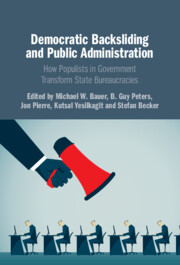 Democratic Backsliding and Public Administration
Democratic Backsliding and Public Administration Published online by Cambridge University Press: 17 August 2021
This chapter addresses the ways in which the Trump administration has exemplified and accelerated a long-term trend toward democratic backsliding in the United States by undermining public sector institutions. The Trump administration has sidelined administrative expertise and scientists in many areas, selecting senior leaders whose lack of qualification is frequently matched only by their disdain for their organizational mission, and shown a willingness to push the boundaries of the law beyond its breaking point. While avoiding a direct attack on civil service legislation, the Trump administration has sought to weaken the ability of public sector unions to negotiate for benefits, punished individuals and units deemed not to be politically loyal, and weakened oversight bodies such as the Merit Systems Protection Board. All of this has been accompanied by a rhetoric of delegitimization, wherein the President and his supporters frequently invoke conspiratorial theories of deep state plots. These tendencies, and the costs that they raise, are illustrated both in President Trump’s impeachment process and a botched response to the coronavirus pandemic.
To save this book to your Kindle, first ensure [email protected] is added to your Approved Personal Document E-mail List under your Personal Document Settings on the Manage Your Content and Devices page of your Amazon account. Then enter the ‘name’ part of your Kindle email address below. Find out more about saving to your Kindle.
Note you can select to save to either the @free.kindle.com or @kindle.com variations. ‘@free.kindle.com’ emails are free but can only be saved to your device when it is connected to wi-fi. ‘@kindle.com’ emails can be delivered even when you are not connected to wi-fi, but note that service fees apply.
Find out more about the Kindle Personal Document Service.
To save content items to your account, please confirm that you agree to abide by our usage policies. If this is the first time you use this feature, you will be asked to authorise Cambridge Core to connect with your account. Find out more about saving content to Dropbox.
To save content items to your account, please confirm that you agree to abide by our usage policies. If this is the first time you use this feature, you will be asked to authorise Cambridge Core to connect with your account. Find out more about saving content to Google Drive.